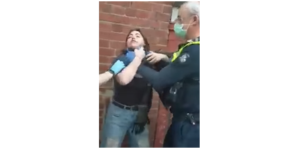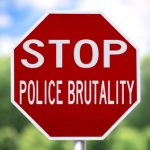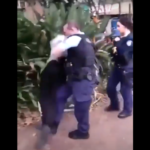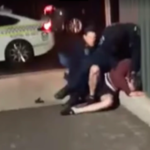Police Officer Chokes and Trips Woman Who is Not Wearing a Mask

Shocking footage has emerged of a police officer using a chokehold and trip to arrest a woman in Victoria.
The woman was approached by officers earlier this week in Collingwood, Victoria. Video footage shows a male officer grabbing the woman by the neck and pinning her against a wall, while the woman repeatedly yells “You’re choking me!”
When a female officer approaches, the woman attempts to kick her away. The male officer then trips the woman to the ground and pins her there.
Brute force
According to reports, the woman ‘flipped officers the bird’ when she was approached and asked why she was not wearing a face mask. But the dramatic and forceful arrest that followed has many concerned that police officers are using brute force in situations when it is clearly not necessary.
The woman was ultimately arrested and charged with assaulting a police officer in execution of duty as well as resisting arrest. Police seem to have been under the belief the woman was not adhering to Covid-19 public health directions, which under stage four require everyone without a medical exemption or lawful excuse to wear a face covering when they are in public, or risk a fine.
However, it has since been reported that the woman indeed had a medical exemption, although it has also been reported she did not immediately present this to the officer. It is unclear whether the officer made enquiries as to whether the woman had a medical exemption or lawful excuse for not wearing a mask.
While it is understood that police are tasked with enforcing the Covid-19 public health laws, and that this was the reason they originally approached the woman, it is a serious community concern that the arrest escalated so quickly, with police officers using such a degree of force.
The US is banning choke holds
Since the death of George Floyd in the US, and after former police officer Derek Chauvin was arrested and charged with third degree murder, there has been global condemnation of the practice of using ‘chockholds’.
In the US, most state police forces have moved swiftly to ban the practice, along with strangleholds, lateral vascular neck restraints and carotid restraints.
But here in Australia, police are still applying such dangerous techniques.
While the nation’s two biggest police forces, New South Wales and Victoria, don’t formally advocate for officers to use chokeholds or respiratory restraints, there is evidence that officers are routinely using these techniques regardless.
The debate about whether chokes and other respiratory constrictions are necessary is controversial, with some claiming they’re better than using weapons.
But, without sufficient training, or in the heat of the moment, too much pressure, pressure to the wrong area of the body or sustained pressure can be dangerous, even lethal.
Police officers broke a man’s neck
Last year, Victoria’s Independent Broad-based Anti-corruption Commission (IBAC) began investigating an incident during which police officers broke a man’s neck when they came to his house to tell him to turn his stereo down.
The story of Chris Karadaglis is frightening and tragic. What happened, according to the victim, is in his own mind just a series of blurred details. In November 2017 police knocked on the man’s front door in response to a noise complaint from neighbours. Minutes later, Chris was quadriplegic, paralysed from the neck down. He recalls only the feeling of being wrapped in a headlock, dragged along his lawn. He remembers hearing a loud click and then feeling limp, struggling to breathe. This was the moment his neck was broken.
The case has since been turned over to prosecutors.
What is ‘reasonable force?’
Police officers in New South Wales are permitted to use ‘reasonable force’ to perform an arrest.
Section 231 of the Law Enforcement (Powers and Responsibilities) Act 2002 (NSW) stipulates that, ‘[a] police officer… may use such force as is reasonably necessary to make the arrest or to prevent the escape of the person after arrest.’
The force that is considered reasonable depends on all of the circumstances of the particular incident, including:
- The nature and seriousness of any offence that is alleged,
- Whether the suspect is armed and, if so, the nature of the weapon, and
- The actions of the suspect before and during the arrest process.
Force that goes beyond what is reasonably necessary is considered an assault under the law.
But many questions remain over what makes up the exact nature of situations which warrant ‘reasonable force’, which is very much open to interpretation, and relies on the judgement of the police officers involved. Of course, police are required to make split-second decisions in many instances, but in recent times their use of aggression and force is increasingly apparent in every day policing.
The arrest has been referred to the police internal investigation unit, the Professional Standards Command for investigation.








